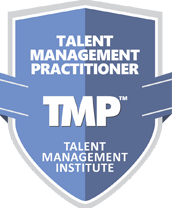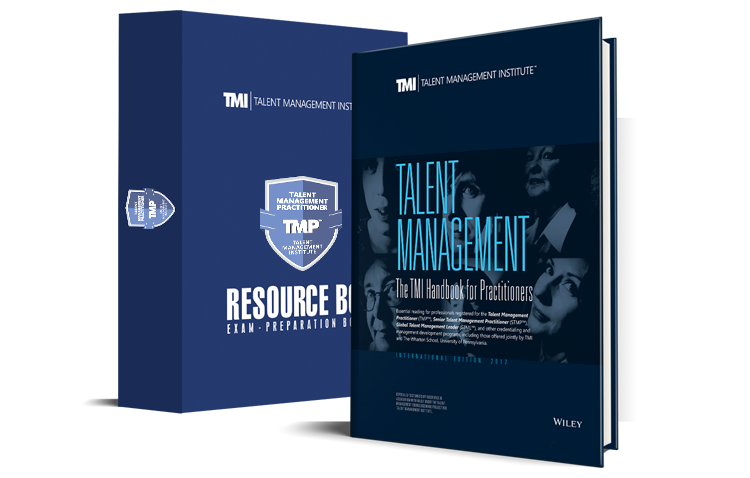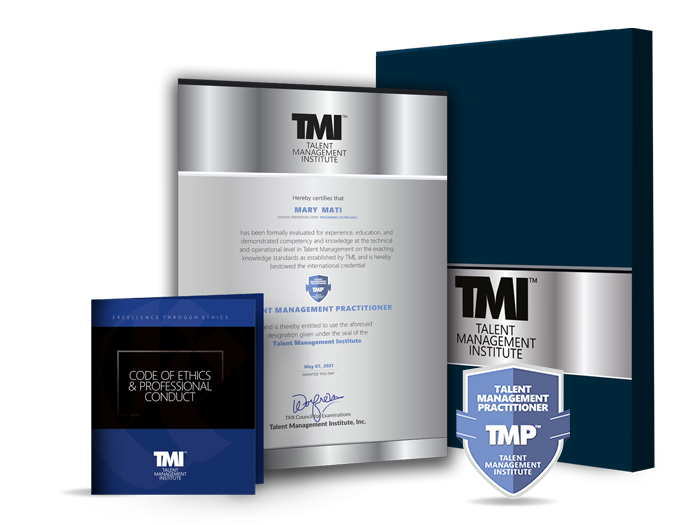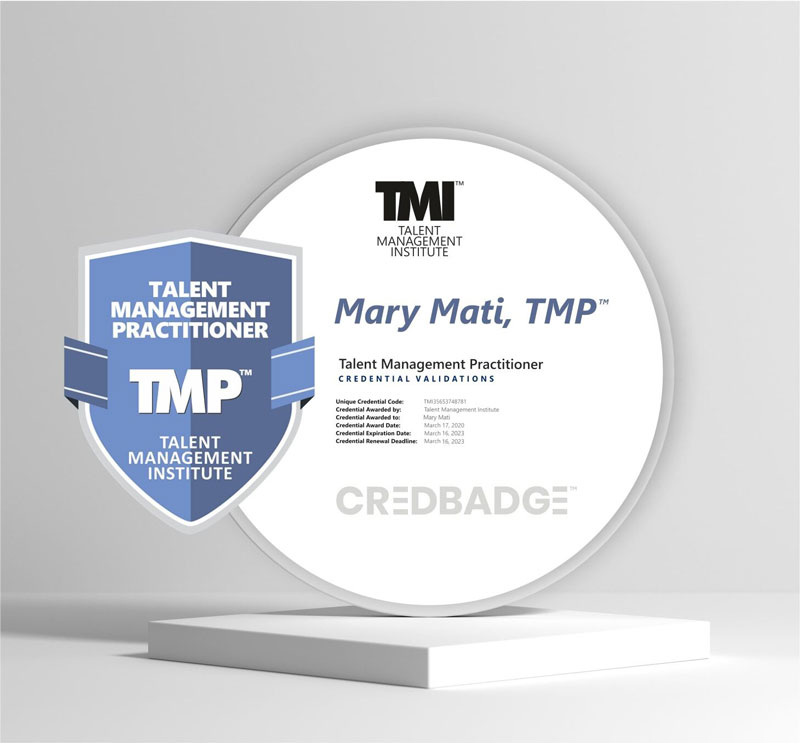TMP™ is the first step in launching a profession in Talent Management and Human Resources for both young HR professionals and recent graduates. Growth in traditional HR positions is plateauing and there is an increasing demand for proven knowledge in Talent Management. TMP™ makes you a more attractive hire for HR recruiters around the world.
The TMP™ Credential is designed for individuals graduating with an HR major or similar discipline from universities and globally or regionally accredited business and HR schools. TMP™ re-engineers your understanding of the field as a modern HR professional. Your HR degree coupled with a Talent Management qualification is a reliable way to establish your career in a high-paying Talent Management function after you graduate. TMP™ makes you a more desirable candidate, which is why MBAs and HR professionals with majors like HRM, Industrial Psychology, Personnel Management, and Labor Relations are increasingly opting for TMP™.

This one-time fee covers 1 (one) TMP™ certification exam attempt, the TMI Resource Box (the TMI Study Kit), the digital badge, the credential case, and all material shipping costs. This fee does not include special local taxes, duties, levies, etc., which may apply to the receiver’s/ consignee’s/ applicant’s country. Refund requests made within 24 hours of making the payment will be subject to a processing charge of US$ 80. No refunds will be issued for registration cancellation requests made after 24 hours of registration.
*We honor military and veterans with special pricing.
Register NowNote : The fee is subject to change without prior notice and does not include the training fee charged by training companies, universities, or institutions authorized to offer exam preparation training for TMI certification exams. TMI is a standards and credentialing body that does not control the delivery of training or education and does not have the authority to govern or mandate the training/program fee charged for any TMI certification by any training company or education provider.
Fast-track your career with TMP™ by learning important concepts in HRM.

TMP™ is for you if you are studying for a career in HR or have been working in HR for one or two years. It is a necessary qualification to demonstrate your readiness to begin working on Talent Management teams with some of the largest global organizations that exist.
Your TMP™ credential is the most credible asset to display your capabilities encompassing the globally tested TMI Universal Knowledge Framework (TMI-UKF™). It is proof that you demonstrate knowledge and understanding of all critical principles, theories, techniques and tools currently practiced in Talent Management.
Click here to register for TMP™All individuals credentialed with TMP™ or enrolled in the program have three things in common
Click here to register for TMP™CHROs around the world increasingly appear to favor young HR professionals with proven competencies in Talent Management. Similarly, students with credible international qualifications in Talent Management are becoming the preferred choice for campus jobs in HR as a certified professional. A TMP™ credential moves you straight to the forefront of your next big career jump.
With the TMP™ title and the TMI registered logo that credentialed individuals get to accompany their names, you can become part of a global community made up of the sharpest minds in Talent Management. Not to mention the fact that the TMP™ credentialed community builds a lifelong relationship with TMI. Throughout their careers, TMI gives individuals the option to upgrade to STMP™, the next level of Talent Management certification. TMI creates a great deal of opportunity for self-development and career improvement, including participation in global TMI forums and events such as the Global Talent Management Summit.
Click here to register for TMP™
Your registration for the TMP™ certification program provides you with both a comprehensive resource box, delivered to you, and a suite of resources accessible on your myTMI dashboard, designed to support your journey to certification:
Physical Resources (Delivered to Your Home in the TMP™ Resource Box):
Digital Resources (Available on your myTMI Dashboard):

*The images are for representation only.
The following table summarizes the specifics of what it takes to become a TMP™. There are SIX convenient tracks covering professionals from diverse backgrounds and experience to earn a TMP™!
Minimum Qualification Required
Should have completed Bachelor's Degree in Human Resource Management/Business/ Management/ Related Disciplines
Minimum Work Experience
6 Months or more experience in any of the HR sub–functions
Minimum Qualification Required
Should have completed Bachelor's Degree in Other disciplines
Minimum Work Experience
2 Years or more experience in any of the HR sub–functions
Minimum Qualification Required
Should have completed Master's Degree/ Master's Level Diploma in Human Resource Management/ Business/ Management/ Related Disciplines
Minimum Work Experience
Currently working in any of the HR sub-functions
Minimum Qualification Required
Should have completed Master's Degree/ Master's Level Diploma in Other disciplines
Minimum Work Experience
1 Year or more experience in any of the HR sub–functions
Minimum Qualification Required
Current & Past students of Bachelor’s/ Master’s Level professional qualifications in Human Resource Management/ Business/ Management/ Related Disciplines from any of the TMI–recognized institutions
Minimum Work Experience
Experience not Mandatory
Minimum Qualification Required
Should hold a Bachelor's degree and possess an active credential by CIPD, HRCI, ATD, SHRM & other certification bodies whose credentials TMI may recognize under the QualiFLY™ program.
Minimum Work Experience
Currently working in any of the HR sub–functions
There are SIX distinct stages of your journey toward becoming a TMP™. Please see the process below for an overview of each stage. For more details, login to your myTMI account.

The TMI Professional Certifications Board (TPCB) mandates that individuals wanting to acquire a TMP™ certification will have to take virtual exams. TMI exams are computer-based tests timed for 120 minutes and delivered on the advanced ExamStrong™ exam platform. Increasingly, individuals are choosing to take their exams in the private proctored mode. TMI offers this flexibility to its examinees who can take their exams at home or in a location of their choice after getting their computer and exam rooms duly verified and approved by ExamStrong. All TMP™ registrants can take their certification exam Online across 183 countries.
The questions appearing in TMI exams aim to check and validate examinees' awareness and knowledge about the general frameworks of Talent Management. This includes key practices and trends in 21st century Talent Management, and critical issues, challenges and opportunities in the discipline today. TMI exams, in keeping with the TMI framework TMI-UKF™ and the TMI Body of Knowledge, steer away from Human Resources and focus exclusively on Talent Management. Examinees are expected to already be knowledgeable in Human Resources to prepare them for a more in-depth course in Talent Management.
TMI certification exams feature questions drawn from a wide selection of Talent Management areas, a knowledge in which the TMI body of knowledge defines as essential to have for individuals intending to be recognized and credentialed by TMI. The framework and coverage of TMI exams is defined by The Talent Management Handbook for Practitioners. The following topics have been specifically assigned by the TMI Professional Certification Board in which the knowledge of examinees are tested:
| Knowledge Dimensions Covered | Total Questions |
|---|---|
|
PART A: Defining Concepts & Perspectives in Talent Management Consists of questions from 5 mandatory knowledge dimensions including management, business and Talent Management imperatives of the 21st century, the Talent Management ecosystem, talent‐need analysis, and talent competence assessment frameworks for organizations. |
15 |
|
PART B: Elements of Strategy & Leadership in Talent Management Consists of questions from 10 mandatory knowledge dimensions including Strategic Talent Management, building competitive advantage through integrated Talent Management, sustainable talent development, talent pipeline building, executive onboarding, identifying and assessing high-potential talent, developing leadership talent, and managing leadership talent pools. |
15 |
|
PART C: Critical Focus Areas of Talent Management Practice Consists of questions from eight mandatory knowledge dimensions sweeping across areas like Talent engagement, building functional expertise, managing and measuring Talent Management effectiveness, global Talent Manage-ment, talent supplies in global organizations, succession planning, performance management, and technology de-ployment in Talent Management. |
21 |
|
PART D: International Talent Management Experiences & Insights Consists of insights, experiences, and cases focused on talent development, integrated Talent Management, talent practices, Talent Management adoption, and boardroom view of Talent Management in some of the world’s most enduring business corporations. It also covers CHRO perspectives on Talent Management as well as perspectives on critical research issues and the future of Talent Management practice. |
9 |
| Total Number Of Questions | 60 |
A typical TMP™ exam includes a mix of Type A and Type B questions for a total of 60 questions.
TYPE A - GENERAL UNDERSTANDING OF CONCEPTS
Questions directly test the examinees' ability to correctly and precisely recollect concepts, principles, techniques, and generally accepted practices in contemporary Talent Management. The answers to TYPE A questions will reflect examinees' awareness and comprehension of critical Talent Management concepts and issues as covered in the TMI body of knowledge. TYPE A Questions are facts based with the answer options being clear statements either clearly correct, or incorrect. There is only one CORRECT answer to TYPE A questions, and examinees are scored only if the correct options are selected.
TYPE B - ABILITY TO APPLY UNDERSTANDING & KNOWLEDGE
Questions directly test the examinees' ability to apply and execute their awareness and understanding of the concepts and principles in the practice of Talent Management. The answers to TYPE B questions will reflect examinees' capacities for critical analysis and judgement in gauging Talent Management challenges. Questions will test examinees' abilities to devise strategic approaches, plans and programs to resolve challenges with accountability and a high degree of effectiveness. TYPE B questions have four answer choices and ONLY one of these four would be incorrect. The rest of the three answers would be correct, but they represent varying levels of suitability for the situation expressed. The best of these three answers carries the maximum 10 marks, and the least suitable the least – 5 marks. The third correct answer with mid-level suitability carries 7.5 marks. Examinees must choose only one of these four answer choices and they are scored 0, 5, 7.5 or 10, depending on their choice of answer–option.
The TMI exams aim to assess the candidate's potential and ability to effectively perform a breadth of Talent Management roles and functions in global organizations of all sizes and complexities. The TMI exam system evaluates this potential by testing the candidates' knowledge of Talent Management theory and practice and their ability to apply this knowledge to achieve excellence in their performance of the roles assigned to them. These exams are designed on standards derived from the TMI Standardized Knowledge Architecture for Practice Excellence.
TMI exams evaluate candidates on their knowledge of the principles, latest theories, techniques, tools, and best practices of Talent Management as laid out in TMI-UKF™. These exams expect that the professionals being assessed have intensively gone through the exclusive/ focused readings in the TMI Resource Box and maintain familiarity with the latest developments in Talent Management theories and practices by reading journals and books, listening to podcasts, and participating in professional development programs and events.
The decision to award a TMI credential is not solely based on an individual's score in the exam. While a score between 65-70% is considered to be passing, the TMI Professional Certification Board follows a benchmarking process that scales the actual scores of examinees on a particular section of the exam and compares them to the entire pool of examinees. This approach ensures that examinees from different regions are not affected by uncontrollable systemic or language barriers and that the certification award recommendation system follows an affirmative-action approach.
TMP™ is for young HR professionals aspiring to break into the Talent Management space. It is critical that all TMP™ candidates focus on widening their perspective of Talent Management. While the TMI TMP™ Resource Box contains reading material and guidelines on how to study for the TMP™ exam, additional research should be done to properly prepare for the exam. Talent Management is an evolving discipline and will perhaps never become an exact science, making containing the entire practice of Talent Management into a single textbook impossible. TMI has evolved its essential knowledge model in what is the world’s largest project on defining knowledge essentials for excellence in Talent Management. As the world's foremost credentialing body in Talent Management, TMI has done its part to cover the extensive breadth of Talent Management to assure that the TMP™ certification makes an impact on the professional capabilities of certification holders.
While TMP™ examinees are clearly advised to use The TMI Practitioner’s Handbook on Talent Management as the master reference for preparing for their exams, the handbook is one piece in preparation for the TMP™ examination. Although a sizable number of questions in a typical TMP™ exam are drawn from content which is available in the Handbook, the rest of the questions in the exam are drawn from content from other sources. TMI therefore strongly advises all examinees to research other online and offline resources to brush up their concepts and awareness about how Talent Management impacts business and HR and how HR today seeks to enhance its effectiveness by better connecting with business, management, and society at large.
To ensure that all TMP™ registrants develop themselves into the best young international professionals, TMI advises they read extensively on the subject from as many sources as possible. For external resources you can use to better prepare for your TMP™ examination, please refer to the TMI Exam Preparation Guidelines available for download under the TMI resources tab of your myTMI account.

*The images are for representation only.
The Credential Pack is yet another reason for the bright and talented TMP™ registrant to work diligently to qualify on their TMP™ Certification Exam as quickly as possible! The prized TMP™ Credential comes cased in a designer box. Tucked neatly inside is a TMP™ designation lapel pin. A TMI Code of Ethics booklet completes the TMP™ Credential Pack – definitely something to treasure.

*The images are for representation only.
The TMP™ is digitally badged instantaneously making it a global credential. You can easily share your TMI credential digitally and securely with current or prospective employers and they can easily verify your certification.
A digitally badged TMP™ creates a more credible Online professional presence. You can conveniently showcase your well earned TMI credential as a high-visibility icon on web pages, your LinkedIn profile, social media platforms, and in your email signature. It is your most secure, reliable, and authentic token of your promise, potential, and capabilities for performing your Talent Management roles with excellence.
The TMP™ digital badge is a verifiable digital token of your TMP™ qualification and contains a secure digital link to the TMI cloud. Here, anyone you have granted access can validate the authenticity of your TMI credential.
Click here to register for TMP™
CredBadge™ is a proprietary, secure, digital badging platform that provides for seamless authentication and verification of credentials across digital media worldwide.
CredBadge™ powered credentials ensure that professionals can showcase and verify their qualifications and credentials across all digital platforms, and at any time, across the planet.

Please enter the License Number/Unique Credential Code of the certificant. Results will be displayed if the person holds an active credential from TMI.